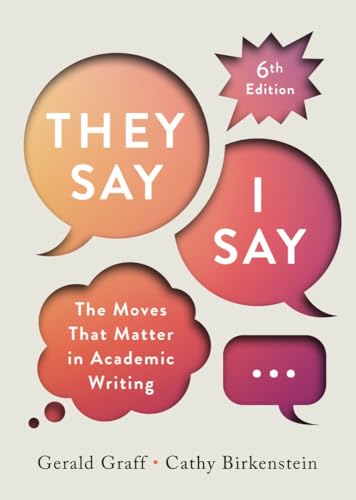
"They Say / I Say"
Gerald Graff, Cathy Birkenstein
Publisher
W. W. Norton & Company
Publication Date
7/1/2024
ISBN
9781324070054
Pages
445
Categories
Questions & Answers
The "They Say / I Say" model is a foundational approach in academic writing that emphasizes engaging with others' perspectives. It encourages writers to summarize and respond to existing arguments ("They Say") before presenting their own ("I Say"). This model transforms academic writing and discourse by:
- Promoting dialogue: It fosters a conversational style, encouraging writers to engage with a wider range of perspectives and ideas.
- Enhancing critical thinking: By analyzing and responding to others' arguments, writers develop a deeper understanding of the topic and refine their own positions.
- Demystifying academic writing: It simplifies the process of academic writing by providing structured templates that guide students through the process of constructing arguments.
- Encouraging empathy and understanding: The model encourages writers to consider different viewpoints, fostering empathy and a more nuanced understanding of complex issues.
- Improving argumentation: By explicitly addressing counterarguments, writers strengthen their arguments and demonstrate a comprehensive understanding of the topic.
The templates and exercises in the book facilitate critical thinking and argumentative skills by providing structured frameworks for students to engage with and respond to others' arguments. By using the "they say / I say" template, students learn to summarize and analyze different perspectives, which enhances their understanding of complex issues. The exercises encourage students to apply these templates in various contexts, such as summarizing quotes, agreeing and disagreeing simultaneously, and embedding voice markers, which helps them develop precise and nuanced arguments. Additionally, the book emphasizes the importance of addressing the "so what?" and "who cares?" questions, prompting students to consider the relevance and impact of their arguments. The inclusion of personal narratives and the use of AI tools like chatbots further encourages students to explore their own perspectives and engage with diverse viewpoints, fostering a more comprehensive and critical approach to argumentation.
Metacommentary plays a crucial role in the book by emphasizing the importance of explaining and clarifying one's arguments to readers. It enhances the effectiveness of academic writing by:
-
Clarifying Intentions: Metacommentary helps writers clarify their intentions and avoid misunderstandings, ensuring that readers understand the writer's true meaning.
-
Anticipating Objections: By anticipating and addressing potential objections, writers demonstrate their awareness of different perspectives, enhancing the credibility of their arguments.
-
Guiding Readers: Metacommentary provides a roadmap for readers, helping them follow the argument's progression and understand the connections between different points.
-
Enhancing Depth: It allows writers to elaborate on their ideas, providing additional context and depth to their arguments.
-
Improving Text Structure: By using metacommentary, writers can improve the structure of their text, making it more coherent and persuasive.
Overall, metacommentary is a powerful tool that helps writers engage with their audience, strengthen their arguments, and produce more effective academic writing.
The book addresses the challenges of reading and interpreting complex texts by emphasizing the importance of engaging with the "they say / I say" format. It encourages readers to identify and understand the positions of others before forming their own responses. For literary analysis, it suggests looking for conflicts within the text and considering multiple interpretations, while also emphasizing the need to ground arguments in evidence and acknowledge alternative perspectives. In scientific research, the book highlights the significance of describing data, presenting prevailing theories, and interpreting findings, while also emphasizing the importance of critical analysis and considering the broader implications of the research. By focusing on these strategies, the book equips readers with the tools to engage with complex texts more effectively.
The "They Say / I Say" model has significant ethical implications for democratic citizenship and responsible public discourse. By emphasizing the importance of summarizing and responding to others' views, the model encourages active listening and critical engagement with diverse perspectives. This practice fosters ethical behavior in several ways:
-
Fairness and Respect: The model promotes fairness by ensuring that all voices are heard and considered, which is crucial for democratic processes. It encourages respect for differing opinions, reducing the likelihood of dismissive or disrespectful attitudes towards others.
-
Informed Decision-Making: By engaging with a range of viewpoints, individuals can make more informed decisions, which is essential for a functioning democracy.
-
Constructive Dialogue: The model encourages constructive dialogue and debate, which can lead to better solutions and outcomes. This is particularly important in public discourse, where respectful exchange of ideas is vital for progress.
-
Self-Reflection: The model encourages individuals to question their own beliefs and biases, promoting self-awareness and personal growth.
-
Accountability: By acknowledging and responding to others' views, individuals and groups are held accountable for their arguments and actions, which is essential for responsible public discourse.
In summary, the "They Say / I Say" model contributes to democratic citizenship and responsible public discourse by promoting fairness, informed decision-making, constructive dialogue, self-reflection, and accountability.